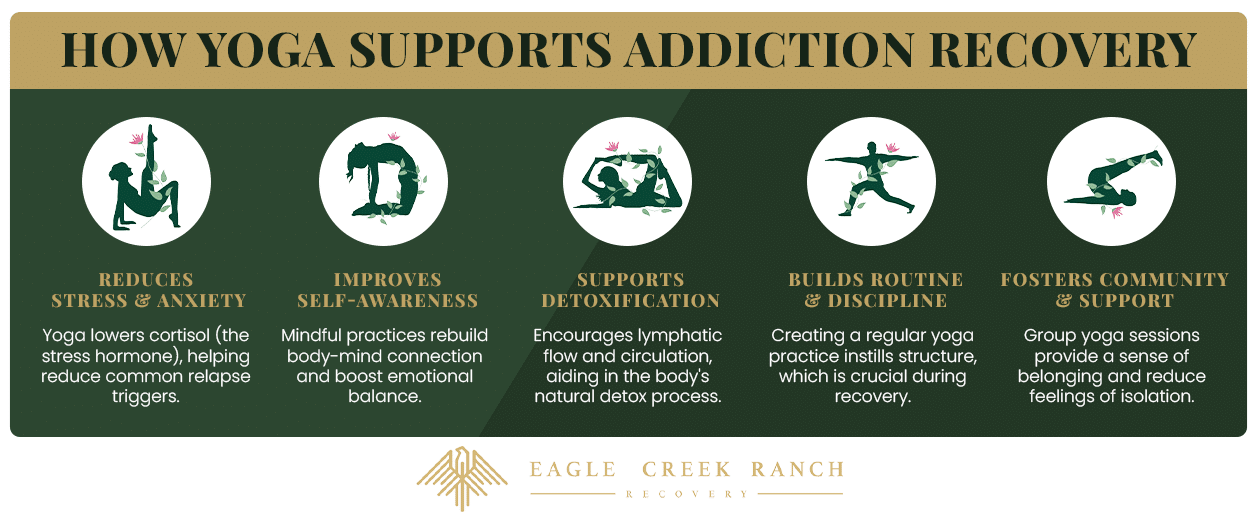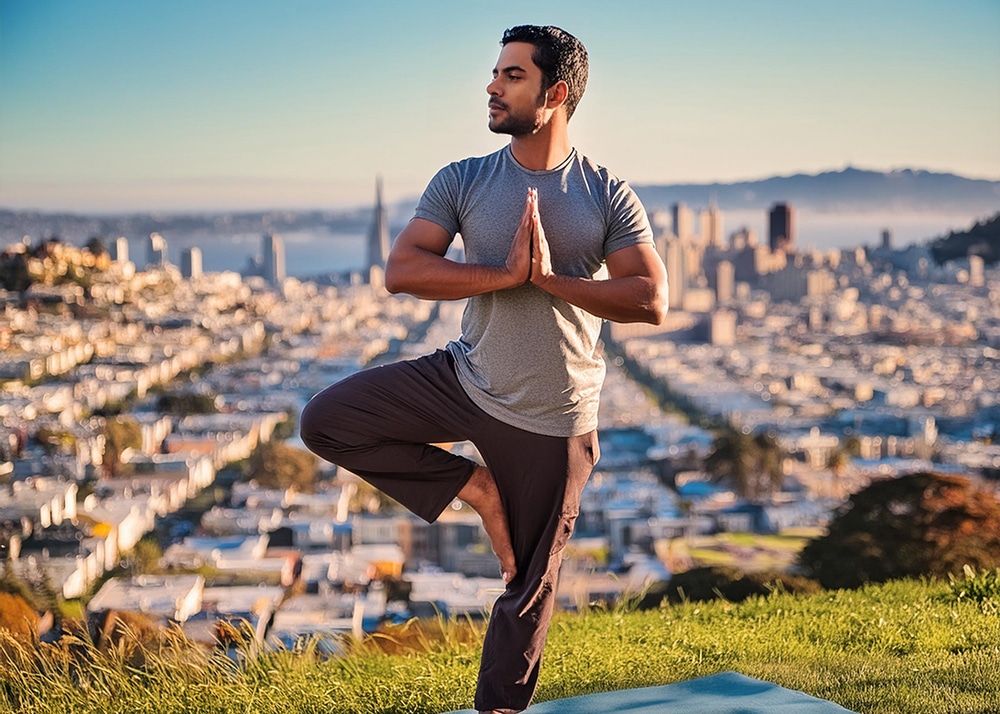Yoga for Addiction Recovery: The Benefits
Have you ever tried yoga? If not, you’re missing out. Yoga provides some serious benefits for both the body and mind. The controlled breathing, gentle poses, and meditation techniques involved in yoga help reduce stress and anxiety, increase flexibility and strength, and promote an overall sense of well-being. For those struggling with addiction, a regular yoga practice can be particularly helpful for recovery.

In the changing field of addiction treatment, holistic methods like yoga for addiction recovery make a big impact. Yoga works well with traditional approaches by recognizing the connection between the mind, body, and spirit. This combination is especially helpful for those facing a tough addiction recovery. Incorporating yoga into treatment demonstrates a commitment to dealing with addiction more thoroughly and effectively, marking a significant step toward a fuller and better recovery journey.
Yoga is a safe and simple form of exercise. If you’re new to recovery, it’s good to start slowly and pay attention to how your body feels. Before you start exercising, talk to your doctor. They can help you find the right kind of yoga and the right teacher for you. This way, your recovery plan can not just be strong but also fit you well. With regular practice, yoga can be a powerful tool for overcoming addiction and sustaining a life of health and wellness.
Contact Eagle Creek Ranch Recovery
Today!
Why Wait? Find The Help You Need By Reaching Out To Us Today! Our Admissions Team Is Standing By.
How Yoga Therapy Differs from Yoga

Yoga and yoga therapy share a foundation in the principles and practices of yoga, but they differ in their scope, focus, and application. Yoga, in its broad sense, encompasses a holistic approach to harmonizing the body, mind, and spirit through practices like physical postures, breath control, and meditation. It is often practiced in various settings, addressing general well-being, fitness, and spiritual growth.
On the other hand, yoga therapy is a more specialized field that specifically targets health concerns. Yoga therapists undergo additional training, often in healthcare or psychology, to design personalized yoga programs for individuals dealing with specific conditions. These one-on-one sessions involve adapting traditional yoga practices to suit individual needs, making yoga therapy a tailored and targeted approach. Recognized increasingly in healthcare, yoga therapy is integrated as a complementary method alongside conventional medical practices to address various health issues and promote overall well-being.
What are the Different Types of Yoga to Try During Recovery?
Engaging in yoga for addiction recovery can be a beneficial and holistic approach to support overall well-being. Different types of yoga cater to various preferences and needs. Here are some types of yoga that individuals might consider trying during their recovery:
Hatha yoga is one of the most popular forms of yoga, especially for beginners. It focuses on basic postures, breathing exercises, and meditation. Hatha yoga moves at a slow pace, allowing you to ease into poses and focus on alignment and balance. This gentle, calming form of yoga is ideal for those in recovery.
Vinyasa yoga provides a smooth flow from one pose to the next, synchronized with your breathing. This energizing form of yoga helps build strength and flexibility. Vinyasa classes can vary in pace, so look for labels like “slow flow” or “gentle” if you want to start slowly. The constant movement in Vinyasa yoga helps release feel-good hormones like endorphins that can aid the recovery process.
Yoga nidra, also known as yogic sleep, is a state of consciousness between waking and sleeping. It is one of the deepest forms of meditation. During Yoga Nidra practice, you lie down and are guided through visualization and awareness of your body. This form of yoga is profoundly relaxing and helps reduce anxiety and stress. Yoga Nidra can be an effective tool for recovery as it calms the mind and nervous system.
Yin yoga is a slow-paced style that focuses on deeper stretches of connective tissues and ligaments. Poses are held for 3 to 5 minutes, allowing you to sink into the posture. Yin yoga is meditative and helps increase flexibility and range of motion. The long, passive holds calm the mind and release tension, making it ideal for addiction recovery.
Yoga provides many benefits for those in recovery. Experiment with different styles to find what resonates most with you. The calming, centering effects of yoga can support you through every stage of your recovery.
How Yoga Impacts the Brain and Body
Yoga has some serious effects on both your brain and body. Studies show that regular yoga practice can help reduce stress and anxiety, boost mood and overall happiness, and enhance self-awareness and acceptance.
Physically, yoga helps build strength and flexibility. It incorporates balance, posture, stretching, and core work.
Yoga movements, or asanas, work your muscles and joints through their full range of motion. This helps increase flexibility and mobility over time. Yoga also builds strength, especially in the core muscles. Holding yogic postures helps tone your abs, back, and pelvic floor muscles.
Beyond the physical, yoga impacts your mental and emotional state. As you move through postures and focus on your breath, your mind settles into a meditative state. This focused awareness helps shift your mind from a state of stress or anxiety into a state of relaxation and calm. Over time, regular yoga practice can help rewire your brain to have a more positive outlook and response to stress.
Yoga is also said to stimulate the vagus nerve, which is responsible for the body’s relaxation response. As your vagus nerve tone improves with yoga, your body gets better at relaxing and calming itself. This can help decrease symptoms of anxiety disorders, depression disorders, post-traumatic stress disorder (PSTD), and addiction.
The Proven Benefits of Yoga for Addiction Recovery
One of the most promising benefits of yoga for addiction recovery is how it affects your brain and body. Yoga releases feel-good hormones like serotonin that improve your mood and act as natural antidepressants. It also increases the levels of gamma-aminobutyric acid (GABA), a neurotransmitter that helps regulate anxiety and promote relaxation.
Yoga provides benefits that appear both immediately and over time. A single yoga class can provide an instant mood boost and stress relief. However, over time, regular yoga practice can lead to an increase in gray matter in the parts of the brain involved in self-control, focus, and emotional regulation. This can help strengthen your ability to avoid triggers and deal with cravings and negative emotions healthily. Some of the key benefits of yoga for addiction recovery include the following:
- Reduced stress and anxiety: Utilizing controlled breathing and gentle movements, yoga works to pacify both the body and mind. This, in turn, can contribute to alleviating feelings of stress, worry, and anxiety that frequently act as triggers for substance abuse.
- Improved sleep: Yoga relaxes the body and mind, making it easier to fall asleep and sleep more soundly. Adequate sleep is essential for overcoming addiction and maintaining sobriety.
- Increased self-awareness: Yoga helps you develop a stronger connection with your body and mind. This can lead to greater self-awareness and help you understand the underlying causes of your addiction.
- Healthier coping skills: Yoga gives you tools to stay centered and calm in stressful situations. The breathing and meditation techniques can be used at any time to avoid unhealthy coping behaviors.
- Sense of community: Yoga classes provide social interaction and support from others in recovery. This can help combat isolation and strengthen your commitment to sobriety.
Tips for Starting a Yoga Practice During Addiction Treatment
Starting a yoga practice during addiction recovery can be challenging but also rewarding. Here are some tips to help you establish a successful practice:
There are many types of yoga, from gentle hatha yoga to hot power yoga. Try different styles to find one you connect with. For recovery, gentler styles like Hatha, Iyengar or vinyasa yoga are good for beginners. They focus on breath, alignment, and flow between poses.
Don’t push yourself into difficult poses or intense practices right away. Begin with just 15-20 minutes a day, a few times a week. You can build up your practice over time as your flexibility and strength improve. Be patient and compassionate with yourself.
Yoga incorporates conscious breathing with physical movements. Paying attention to your inhales and exhales helps quiet your mind and increases awareness of your body. Taking some deep breaths before starting your practice can help shift your mindset.
Taking a beginner’s yoga class with an experienced teacher is the best way to learn proper form and technique. They can give you tailored guidance and help you modify poses as needed. Many treatment centers and gyms offer beginner yoga classes with certified instructors. You can also look for classes at local yoga studios.
Make yoga a habit and a priority. Try to practice at the same time a few times each week to build consistency. Notice how you feel before and after practicing – the benefits you gain will keep you motivated to continue.
Keep an open mind and be gentle with yourself – a successful yoga practice will emerge over time. Focus on how it makes you feel rather than how flexible or strong you are. Yoga is a journey, so take it one day and one breath at a time.
Yoga Therapy for Drug and Alcohol Addiction in Nampa, Idaho
Nestled in the serene landscapes of Nampa, Idaho, a revolutionary approach to addiction recovery is taking root. While traditional methods play a crucial role, the integration of yoga therapy has proven to be a game-changer for those seeking a holistic and sustainable path to sobriety.
Our team at Eagle Creek Ranch Recovery wholeheartedly recognizes and embraces the advantages that yoga therapy and various holistic programs can provide to every individual under our care. Alongside these, we provide a range of other therapeutic modalities, ensuring a comprehensive approach to well-being.
- Individual Therapy
- Group Therapy
- Cognitive therapy
- Dialectical Behavioral Therapy
- Adventure Therapy
- Family Therapy
- Motivational Interviewing
- Equine Therapy
- Dual-Diagnosis Therapy
Please get in touch with us now! Our experienced team is ready to guide you through the next steps towards lasting positive change.

Clinical Director
Kendall Maloof is the clinical director at Eagle Creek Ranch Recovery. She is a licensed marriage and family therapist and has held multiple leadership roles before settling here at Eagle Creek Ranch Recovery. Kendall received her master’s degree in marriage and family therapy from the Chicago School of Professional Psychology in 2016. Her career in mental and behavioral health began in 2014 when she took up internships in both the nonprofit and for profit sectors. She interned at multiple reputable companies, such as The Living Success Center and 449 Recovery in California.
In 2019, Kendall became the clinical director of Sunsets Recovery for Woman, a dual diagnosis program in southern California. Kendall is a natural leader. She has an incredible ability to problem solve and stay calm in any situation. Kendall never fails to show up when she is needed, and her calm demeanor makes her team and clients feel at ease. Eagle Creek Ranch Recovery is proud to have Kendall as our clinical director.



